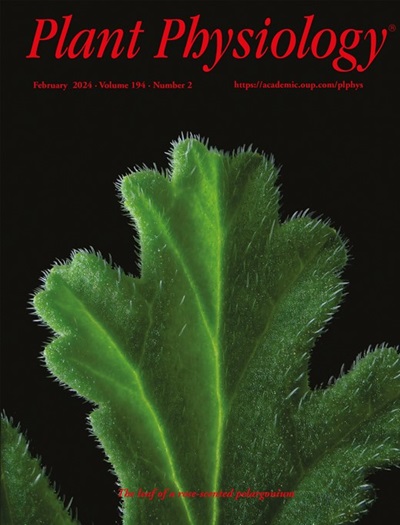通过Opaque2-OHP2-EREB58-EREB177模块激活Dek601调控玉米籽粒发育。
IF 6.9
1区 生物学
Q1 PLANT SCIENCES
引用次数: 0
摘要
BAHD酰基转移酶是一类特殊的植物酶,参与次级代谢物的酰化,但它们在种子发育中的作用仍然知之甚少。在这项研究中,我们在玉米(Zea mays) W22遗传背景中发现了缺陷型601 (dek601)突变体,该突变体表现出胚胎和胚乳发育缺陷,导致籽粒比野生型(WT)更小和萎缩。通过定位克隆,我们将致病基因Zm00001d039535(也称为Disorganized wall 1, Dow1)定位到3号染色体上。该基因的突变引起移码并破坏蛋白质功能,这一点已通过互补测试得到证实。Dek601编码BAHD家族酰基转移酶,其表达受转录因子Opaque2 (O2)、乙烯响应元件结合蛋白58 (EREB58)和乙烯响应元件结合蛋白177 (EREB177)的调控。这些因子结合Dek601启动子并调节其表达。此外,DEK601与酰基活化酶19 (ZmAAE19)相互作用,表明它们在下游酶过程中具有潜在的功能协同作用。代谢组学分析显示,dek601核的代谢谱发生了显著变化,包括碳水化合物的下调,氨基酸和苯丙素和类黄酮代谢途径的代谢物的上调。本研究表明,Opaque2-OHP2-EREB58-EREB177调控模块控制Dek601的表达,Dek601和ZmAAE19可能协同影响代谢物的生物合成,从而调节玉米的籽粒发育。本文章由计算机程序翻译,如有差异,请以英文原文为准。
Transactivation of Dek601 by the Opaque2-OHP2-EREB58-EREB177 module regulates kernel development in maize.
BAHD acyltransferases are a specialized class of plant enzymes involved in the acylation of secondary metabolites, yet their roles in seed development remain poorly understood. In this study, we identified the defective kernel 601 (dek601) mutant in the maize (Zea mays) W22 genetic background, which exhibits defective embryo and endosperm development, leading to smaller and shrunken kernels compared to wild type (WT). Using positional cloning, we localized the causal gene, Zm00001d039535 (also known as Disorganized wall 1, Dow1), to chromosome 3. A mutation in this gene causes a frameshift and disrupts protein function, which was confirmed through complementation tests. Dek601 encodes a BAHD family acyltransferase, and its expression is regulated by the transcription factors Opaque2 (O2), Ethylene-Responsive Element Binding Protein 58 (EREB58), and Ethylene-Responsive Element Binding Protein 177 (EREB177). These factors bind to the Dek601 promoter and modulate its expression. Furthermore, DEK601 interacts with the Acyl-activating enzyme 19 (ZmAAE19), suggesting their potential functional synergy in downstream enzymatic processes. Metabolomic analysis of dek601 kernels revealed significant shifts in metabolic profiles, including a downregulation of carbohydrate compounds and an upregulation of amino acids and metabolites from the phenylpropanoid and flavonoid pathways. This study demonstrates that the Opaque2-OHP2-EREB58-EREB177 regulatory module controls Dek601 expression, and DEK601 and ZmAAE19 likely collaborate to influence metabolite biosynthesis, thereby regulating kernel development in maize.
求助全文
通过发布文献求助,成功后即可免费获取论文全文。
去求助
来源期刊

Plant Physiology
生物-植物科学
CiteScore
12.20
自引率
5.40%
发文量
535
审稿时长
2.3 months
期刊介绍:
Plant Physiology® is a distinguished and highly respected journal with a rich history dating back to its establishment in 1926. It stands as a leading international publication in the field of plant biology, covering a comprehensive range of topics from the molecular and structural aspects of plant life to systems biology and ecophysiology. Recognized as the most highly cited journal in plant sciences, Plant Physiology® is a testament to its commitment to excellence and the dissemination of groundbreaking research.
As the official publication of the American Society of Plant Biologists, Plant Physiology® upholds rigorous peer-review standards, ensuring that the scientific community receives the highest quality research. The journal releases 12 issues annually, providing a steady stream of new findings and insights to its readership.
 求助内容:
求助内容: 应助结果提醒方式:
应助结果提醒方式:


